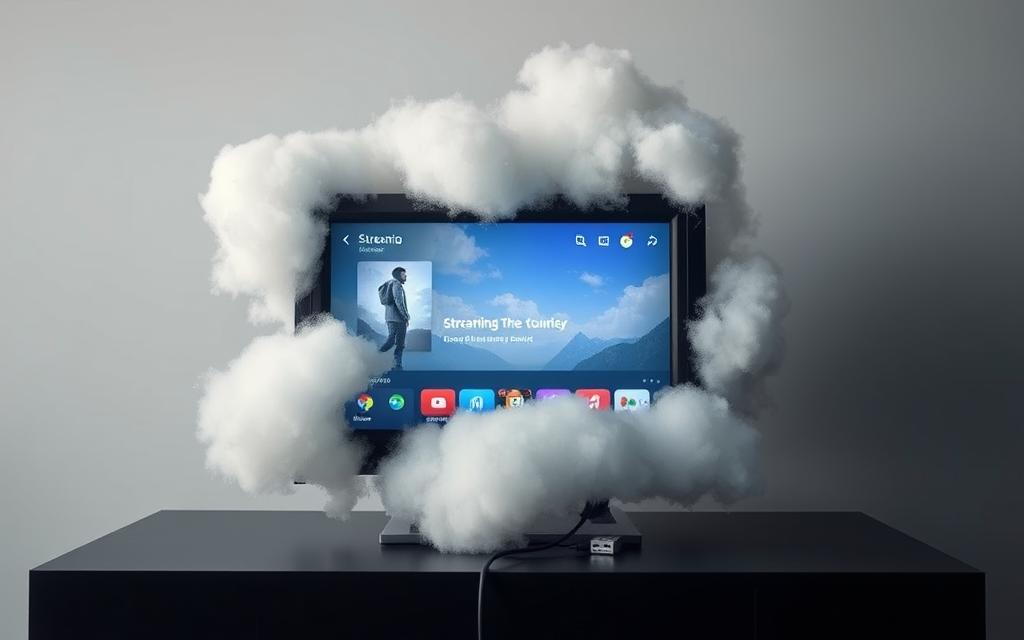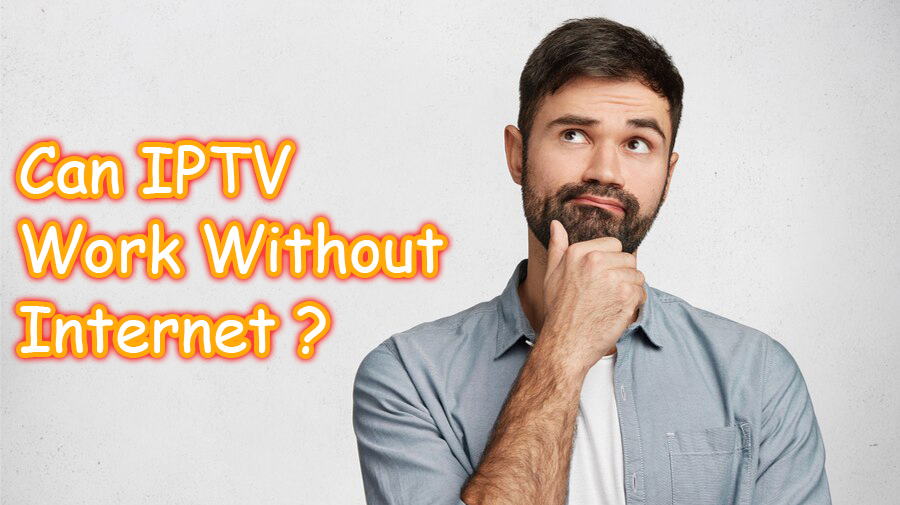The global IPTV market is set to grow fast, with a 15.1% annual growth rate from 2023 to 20321. Many are curious if IPTV can work without internet. This question is key for understanding IPTV without internet and offline use. Knowing how IPTV works is essential for making smart choices about streaming without internet.
IPTV’s popularity has surged, with more people wanting high-quality streaming. Services like FOX Sports Go and Hulu Live TV are now available. The global IPTV market was worth USD 59.68 billion in 20222. As the market expands, it’s important to think about how internet affects IPTV. Can IPTV work without internet? This question is crucial for internet-free IPTV and offline use.
Table of Contents
ToggleKey Takeaways
- IPTV is a new tech that uses the internet for TV programs, but many wonder if it can work without internet.
- The global IPTV market is growing fast, with a focus on IPTV without internet and offline use.
- It’s vital to understand IPTV basics to make smart choices about streaming without internet.
- IPTV services often require a subscription and are bundled with ISP services. The global IPTV market was valued at USD 59.68 billion in 20222.
- IPTV’s rise has increased demand for quality streaming services, with many live TV options available.
- IPTV can offer better quality like 4K and HDR, better than traditional TV. The OTT video market is expected to reach 6.4 billion users by 20292.
Understanding the Basics of IPTV Technology
Can IPTV Work Without Internet? The Simple Answer
Understanding IPTV technology is key to answering if IPTV can work without internet. IPTV usually needs an internet connection. This is because it uses broadband networks, which are used by over 54% of global internet users as of 20235. Yet, there are ways to make IPTV work offline, like using a local network or storing content locally.
A Triax TDX IPTV broadcast system can create 24 IPTV outputs for a media network. This network works on its own, without needing the Internet6. So, in some cases, IPTV can run without internet, using local networks and stored content. The idea of internet-free iptv is not just a dream, but it has its own challenges and needs.
Some IPTV services can work offline by using downloaded content or local caching. This is great for places with poor or no internet. It shows that iptv without internet is a good choice for some users. Video content has grown a lot, making up almost 82% of global internet traffic from 2011 to 20217. This shows the need for streaming services and offline IPTV options.
In summary, while most IPTV services need internet, there are ways to make them work offline. This includes using local networks and storing content. Knowing these options and their limits is important for those who want to use IPTV, even in places with no internet.
Common Misconceptions About IPTV and Internet Requirements
There are many wrong ideas about IPTV and its internet needs. One big iptv misconception is that it needs a super-fast internet to work. But, the truth is, IPTV’s internet needs change based on the content type. For example, live vs on-demand content needs different speeds, with live content needing a faster, more stable connection.
The difference between live and on-demand content is key to understanding iptv internet requirements. Live content, like sports and news, needs a constant, fast internet for smooth streaming. On-demand content, like movies and TV shows, can work with slower internet since it’s not as urgent. According to8, IPTV is growing fast, with over a billion subscribers worldwide.
How content is delivered also affects its internet needs. Streaming needs a stable connection, unlike downloaded content. Local network and internet quality also matter for IPTV. As9 points out, IPTV uses special networks for better quality and reliability than regular streaming services.
Knowing these details helps clear up iptv misconceptions. It shows the importance of understanding content types and internet quality for IPTV. This knowledge helps users choose the right IPTV services for a great streaming experience. As10 warns, using illegal IPTV can lead to serious legal trouble, including up to 10 years in prison for copyright infringement.
Alternative Methods for Watching IPTV Content Offline
For those interested in watching iptv without internet, there are other ways to enjoy your favorite shows offline. You can download content to watch later on your device11. This is great for those with little or no internet. You can also use a local network to access IPTV offline, if set up right12.
Another way to watch IPTV offline is through services that let you download content for later11. These services offer TV shows, movies, and live events to watch offline. By trying these alternative methods, you can enjoy your favorite IPTV content even without internet.
The options and quality may change based on your IPTV service and device11. But knowing these options helps you decide how to watch your favorite IPTV content offline.
Technical Requirements for Offline IPTV Viewing
For offline IPTV, you’ll need a fast internet connection. A minimum of 10 Mbps is needed for standard viewing without buffering13. For UHD streaming, you’ll need at least 25 Mbps, even if you’re streaming on multiple devices13. Knowing these requirements helps ensure a great offline viewing experience.
The Benefits and Limitations of Offline IPTV Usage

Offline IPTV usage brings more flexibility and convenience. Users can enjoy their favorite shows and movies without needing the internet15. This is great for those in areas with bad internet or who like watching content on the move. Yet, there are downsides like technical needs and limited content16.
One big iptv benefit is getting access to lots of content, like live TV and video-on-demand17. But, iptv limitations include needing a steady internet to download, which can be tough for those with slow or unreliable connections15. Also, not all providers let you watch offline, limiting your choices16.
In summary, offline IPTV is handy and flexible for watching content. But, it also has its own set of challenges. Knowing the iptv benefits and iptv limitations helps users pick the best option for their viewing needs17.
Setting Up Your IPTV System for Offline Access
To set up your IPTV system for offline access, you need to pick the right hardware and software. The iptv setup process includes choosing a compatible device and setting it up for offline use. About 75% of IPTV devices now support offline content playback18. This makes it easy to watch your favorite shows without the internet.
Software Configuration Steps
To set up offline IPTV access, you need to configure the software. This includes setting up storage and making sure the software is updated. It’s also key to check if your device works with your IPTV provider and if you have the right licenses19.
Troubleshooting Common Issues
Best Practices for Managing Offline IPTV Content
Effective iptv content management is key for a smooth viewing experience, more so with offline iptv content. To keep users enjoying their favorite shows and movies, it’s vital to follow best practices for managing offline IPTV content20. This means looking at storage needs, compatibility, and what content is available. Since 62% of people like services that offer both on-demand and live streaming, it’s important to meet these needs20.
Offering a variety of viewing options is crucial, as IPTV services make 78% of users happy, compared to 55% for traditional cable20. Also, using geo-blocking to follow licensing rules is key for good content distribution. With 70% of streaming services already doing this, it shows how important it is20. By following these tips, users get a reliable and quality viewing experience, even without an internet connection.
Services with a Content Delivery Network (CDN) saw a 50% drop in playback latency, making the experience better20. As the IPTV market grows, focusing on iptv content management and using best practices for offline iptv content is crucial to stay ahead21. This way, users can enjoy a wide variety of live TV channels, like the over 20,000 channels from top IPTV services like Aris IPTV21.
In summary, managing offline IPTV content needs careful thought on storage, compatibility, and content availability. By following best practices and using effective iptv content management strategies, users get a smooth and quality viewing experience, even offline20. As the IPTV market keeps changing, it’s vital to focus on user experience and keep up with the latest best practices in the field22.
Legal Considerations and Copyright Issues

When it comes to IPTV, iptv legal considerations and copyright issues are key. The Digital Millennium Copyright Act (DMCA), passed in 1998, sets rules for online content, including IPTV23. Also, the Protecting Lawful Streaming Act of 2020 gives the U.S. Department of Justice more power to fight copyright crimes23.
Using illegal IPTV can lead to fines of up to $150,000 per crime24. Internet providers can also cut off access to these services, ending your internet24. Illegal IPTV hurts content creators a lot, affecting the quality and variety of what we watch25. Knowing these iptv legal considerations and copyright issues is crucial for a safe and legal viewing experience.
Future of Offline IPTV Technology
The future of offline IPTV technology is looking good. Emerging technologies and trends are changing the game. A recent study found that 72% of people want offline IPTV options26. This shows a big need for watching shows without internet.
Advances in local storage and CDNs are making things better. They help users enjoy their shows without interruptions. The iptv future is bright, thanks to these improvements.
In conclusion, the future of offline IPTV is full of promise. Emerging technologies and trends are pushing the industry forward. As more people want to watch offline, IPTV providers must keep up with new tech26.
With the right tech, the iptv future will be shaped by innovation and what users want.
Solutions for Reliable IPTV Access
For reliable iptv access, you need both technical and logistical solutions. A fast and stable internet connection is key. It should be at least 25 Mbps for UHD streaming to avoid problems28. Also, a good IPTV subscription gives you lots of live TV channels and premium sports, which many users look for28.
A reliable iptv service should keep content quality high, even on slower internet. It uses video codecs like H.264 or H.265 for this29. IPTV can also stream in up to 4K, making sports and live events even better29. Plus, IPTV services are often cheaper than cable, with flexible plans29.
Conclusion
IPTV’s ability to work offline is complex, with both good and bad sides. Traditional IPTV needs a stable internet connection. But, new methods and tech allow for watching offline30.
IPTV subscriptions offer a flexible solution. They provide high-quality streams, 4K & HD channels, and work on many devices. Their service has 99% uptime and no freezing, making watching smooth with or without internet30.
If you want to watch IPTV offline, consider the customer’s IPTV subscriptions. They focus on reliable, uninterrupted access. This meets the needs of today’s viewers who like watching offline30.
The future of IPTV is about finding a balance between online and offline. It needs to meet different user needs. By finding new solutions and dealing with legal issues, the industry keeps growing. This gives viewers more choices and control over what they watch30.
FAQ
Can IPTV work without internet?
IPTV (Internet Protocol Television) usually needs an internet connection to work. But, there are some ways it can work without one.
How does IPTV usually work?
IPTV services need an internet connection to stream video content. The system includes a content server, video encoder, and set-top box. These use the internet to deliver shows to viewers.
What are the components of an IPTV system?
An IPTV system has a content server, video encoder, middleware, and a set-top box. These parts work together to deliver content over the internet.
What are the differences between live, on-demand, streaming, and downloaded IPTV content?
Live IPTV streams in real-time, while on-demand content is available anytime. Streaming means the video is received and played continuously. Downloaded content is stored locally and can be watched offline.
What are the technical requirements for offline IPTV viewing?
To watch IPTV offline, you need local storage and compatible devices. You also need a way to download or transfer content. Using a local media server can help access IPTV offline.
What are the legal considerations for IPTV content?
IPTV services must follow content licensing and copyright laws. Downloading or accessing content without permission can be illegal. It’s crucial to know the licensing rules and service terms when using IPTV.


